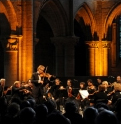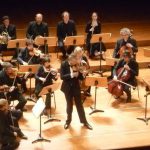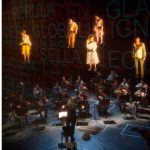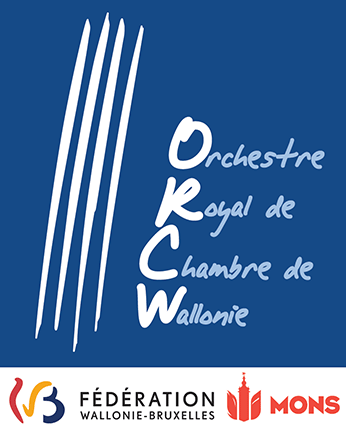MOZART BY AUGUSTIN DUMAY / EXQUISITE COMPLICITY

The Royal Chamber Orchestra of Wallonia scored a triumph in the basilica on Sunday evening. Conducted masterly by Augustin Dumay in great form, it enthralled the audience which was not expecting such splendors. The program was admittedly quite a treat: first, Dvorak’s admirable Romance for violin and orchestra… Then, Mozart, with his Concerto for violin KV 216, and the 29th symphony KV 201 for total bedazzlement! The concerto, in turn elegant, incisive, turbulent and funny, showcased Mozart devoid of his excessive roundness, Mozart that masters such as Harnoncourt, Immerseel or Gardiner have completely redrawn. The soloist – and conductor – joined with obvious complicity in the orchestra playing without ever playing the virtuoso nor trying to dominate.
And yet, what precision! What a sumptuous cadence at the end of the allegro moderato! The final rondo, whence the roguish Strasbourg jibe gushed in an unexpected tempo, let the sun shine – something the sky had obstinately refused to do… …The symphony in A major, handsome, dynamic, dramatic to perfection, painted an accurate portrait of Mozart at 18… who had already overcome the torrid moods of the Sturm und Drang. A superb elocution of the initial theme with its delicate bow vibrato, remarkable hold of the andante which progressed roundly but “cantabile,” a wriggling, ideally dancing minuet, a frenzied finale with sparkling precision. It reminded us of the excellent “Anima Eterna” the year before. And that is saying a lot!
As an encore, A. Dumay and the Orchestra of Wallonia played a fragment from the “L’Arlésienne” [The Girl of Arles] in the memory of Simply splendid! (Read the article).
L’Union – L’Ardennais (France), F. A., 27 juin 2012
Flâneries Musicales de Reims, 24 juin 2012
MOZART SMILE

Toulouse
“Belgium’s oldest chamber orchestra, stamped with the royal seal, has since 2003 been graced with the dynamism and repute of its Musical Director and Principal Conductor, Augustin Dumay. Its rich, warm and opulent sound confers a singular attraction on Symphony no. 29 which takes up the entire second part of the evening. Augustin Dumay delves in this youthful score with vitality, vigor and a keen sense of nuance. He underlines in particular the dynamic contracts, showcasing an expressive crescendo or diminuendo here and there. The orchestra plays with spirit on the echoes and exchanges between sections, woodwinds, horns and oboes, and throwing some fine challenges to the strings (…) The fine, opulent sound of the orchestra finds a willing conductor in Augustin Dumay, but also a soloist with solar color and flawless technique (…) (read the article)
Classic Toulouse / Grands interprètes, Serge Chauzy, 22 juin 2012
Fête de la Musique, Toulouse, Halle aux grains, 22 juin 2012
“Les Pendus” – “De Gehangenen” / Musical Theatre
5 countries. 25 representations.
“Requiem pour une pensée Libre” (Le Soir et La Libre)
Concept : Josse De Pauw & Jan Kuijken / LOD Production

Les pendus
The new production by LOD (Ghent), “De gehangenen – Les pendus”, in which the Royal Chamber Orchestra of Wallonia plays an active part. Five partners from different countries are involved in this international production: KoninkelijkeVlaamseSchouwburg (KVS), Théâtre National de Bruxelles, Grand Théâtre de Luxembourg, Le Maillon Strasbourg, KunstFestSpieleHerrenhausen (Hanover), Vocaal LAB Nederland and Royal Chamber Orchestra of Wallonia.
The Hanged are non-believers who do not tow the line and dare to ask questions out loud. They cannot resign themselves to what is already known and to what is written. They delve into their own research to quench their own thirst for knowledge. No one acknowledges their efforts. They often pay for their curiosity with their life. The musicians of the Royal Chamber Orchestra of Wallonia have staged a composition by Jan Kuijken. A musical story where tensions stem from the interaction between the orchestra, the actors, singers and voice and sound recordings. Two actors and three singers are suspended above the musicians. Josse De Pauw has written for them a recited and a sung part. This show pays homage to all well-meaning visionaries who, because of their convictions, were hanged, martyred, burnt or incarcerated, and tries to provide answers to the question: “Would I be hanged if I think?”
“A fine, cruel and deeply moving show… peppered with humor in an astounding work with lights… Superb!”
LE SOIR Michèle Friche, 04.05.2011
I saw one person cry with emotion. I saw many people get up for a standing ovation, which is rather rare for a premiere. This means that something happened.
DE MORGEN 02.05.2011
The splendor of this show draws its interpretive radiance from the music by the Royal Chamber Orchestra of Wallonia, conducted by Etienne Siebens. It is rare to come across such a balance between acting, singing and music. This show gives food for thought. But those who listen closely experience pleasure equivalent to an excellent performance of a passion or a requiem. Jan Kuijken deserves the credit. But the spiritual father of the concept is and remains Josse De Pauw. He attacks the basic concept with such intensity and delight, that starting from doubt he arrives at a truth that does not kill, but instead wounds, the pertinence of culture. He is concurrently a historian and a poet.
KNACK 02.05.2011
“Les Pendus” is a “memento mori” dedicated to all those who died for having held opinions that went against the grain. De Pauw has opted for an imposing form, but the text dominates the whole.
DE STANDAARD 02.05.2011
Josse De Pauw puts on a magnificent show. (…) Humor is one of the weapons used to get this stirring plea for freedom across (…). These hanged people marked out by a strange light pierce the dark skies. The magic of image and sound makes us hold our breath: poetry and cruelty are superimposed, show and philosophy mixed. (…) Nothing forbidding there, philosophy according to the fine pen of Josse De Pauw (who also directed the show) flies up the peaks, with the feet firmly on the humor of the ground. (…) “Les Pendus” is a new act of faith in tolerance, the union of communities and the defenders of the freedom of thought which takes its full meaning in contemporary times.
LE SOIR 03.05.2011
“Les Pendus” by Josse De Pauw, is a fine mini opera on the dangers of thought.. (…) The image is strong and obsessive from the outset. (…) Josse De Pauw’s text is full of warmth and speaks of nature and sensuality as much as for the need to think and to seek. (…) A tour de force of rhetoric and sensuality, the voice part sticks to the text, sustained by three singers (hanged, too) with a full tone, Janneke Daalderop, Soprano, Ekaterina Levental, mezzo soprano, and Steven van Gils, tenor, and the “child’s” voice off, a casting revelation.
LA LIBRE BELGIQUE 03.05.2011
The splendid voices of JannekeDaalderop (soprano), Ekaterina Levental (mezzo soprano), Steven van Gils (tenor) and the tender, ever so poignant child’s voice of Lidewei Loot, plus the inspired score of Jan Kuijken played with uttermost finesse by the Royal Chamber Orchestra of Wallonia, a string ensemble conducted by Etienne Siebens, as well as, by way of contrast, the soloist Jan Kuijken himself and his cello on a disquieting soundtrack, the enthralling performance of actors Hilde Van Mieghem and Tom Jansen, and the inventiveness of Enrico Bagnoli’s light effects… all, positively all, combine to make this show one of the most brilliant of the Kuijken-De Pauw duo, the latter of whom directed. Admirable.
RUE DU THEATRE 06.05.2011
“This evening at 7:00, one of Europe’s most prestigious ensembles, the Royal Chamber Orchestra of Wallonia, will give an extraordinary Mozart concert in the Romanian Atheneum”.
NINE O’CLOCK (Bucharest), CostinTuchila, 21 December 2006 – Concert in the Romanian Athenaeum, Bucharest
“It is a particular, exceptional event. The Royal Chamber Orchestra of Wallonia played on two evenings at the Beijing music festival. The event is huge. The guests at the Beijing Festival are selected carefully among the best in the world. The selection is strict and many orchestras are left behind, in spite of repeated requests. The performance by the Royal Chamber Orchestra of Wallonia was exceptional also because of the setting in which it took place. The concert hall of the forbidden city is among the best in Asia. (…) It was also exceptional because of the program on offer. Whereas on Monday, the orchestra played in sum a rather classical repertoire, devoted to Mozart, the evening before it merged with the China Philharmonic Orchestra for a flawless multi-colored performance under the baton of the conductor Long Yu (…) The mix of genres and cultures occurred almost naturally without a false note. This is thanks to the quasi physical performance: the two orchestras had only two days to tune the violins, whilst the Belgian musicians had to cope with 6 hours of jetlag.”
LA LIBRE BELGIQUE, Vincent Rocour, 24 October 2006 – Beijing Festival
“This is the first time that a Belgian orchestra is invited to this event which usually has a predilection for the Vienna Philharmonic or the Scala of Milan, in a splendid concert hall in the very heart of the highly symbolic Forbidden City. Augustin Dumay wanted a real meeting between two cultures: the musicians are mixed, the gestures synchronous as if they had always rehearsed together.”
LE SOIR, Frédéric Soumois, 24 October 2006 – Beijing Festival
“Sunday evening was quite exceptional in Beijing. The Forbidden City played host to the Royal Chamber Orchestra of Wallonia in the presence of three French-speaking ministers! (…) It is worth knowing, in fact, that this immense residence of the imperial family, in the very heart of the city, has had a concert hall with extraordinary acoustics for more than 60 years. And every year, the Beijing Festival, held in October, invites the most prestigious international orchestras (…) Hats off then, to the Chamber Orchestra, which has in turn carried the Region’s musical fame far beyond our borders. We may moreover underscore that last evening’s concert, performed before more than 1200 people, was a resounding success. And perhaps Chinese works might find their way into the Orchestra’s repertoire, or in any event, be performed soon on our shores.”
VERS L’AVENIR, Marie-France GIHOUSSE, 23 October 200 – Beijing Festival
“Few international orchestras have the chance to play in the concert hall of Beijing’s famous Forbidden City. Its doors are opened for the Scala of Milan, the Vienna Philharmonic or the Berlin Opera. The Chamber Orchestra has just managed to add its name in gold this weekend. Better yet, it shared the stage in a mixed concert with the China Philharmonic Orchestra! It was a great moment for the conductor of the Royal Chamber Orchestra of Wallonia, Augustin Dumay, who also performed (violin), but also for his musicians, scattered in a mythical setting on Sunday among the China Philharmonic. The eclectic performance was rewarded with an ovation by the public. ”
LA PROVINCE, M. R., 24 October 200 6- Beijing Festival
“Royal Chamber Orchestra of Wallonia: the performance (…) is no longer a matter of “progress” but of “level” – international in the case at hand – sustained by first rate, totally committed musicians (…) The most intense moment, which elicited the greatest acknowledgement from the public, was undeniably Symphony no. 29, Mozart’s first “great” symphony, with the orchestra, always under the baton of that beanpole Augustin Dumay, serving an ideal version of mastery, vitality and simplicity (the key word).”
LA LIBRE BELGIQUE, Martine Dumont-Mergeay, 4 October 2006 – “Mozart” Concerts with Maria Joao Pires, Ricardo Castro and Augustin Dumay in the Brussels Centre for Fine Arts, in Eindhoven and at the Théâtre des Champs-Élysées, Paris
“The fantastic Portuguese pianist Maria Joao Pires is a musical personality that has conquered the world’s heart (…) The violinist Augustin Dumay is also a first rate musician. Like Pires, he plays from the inside, with an enormous “musical frame,” a formidable sound, and charisma that takes one’s breath away (…) He also conducts one of the oldest Belgian orchestras, the respectable “Royal Chamber Orchestra of Wallonia,” which under his baton, produces a marvelous range of colors (…)(…) What a masterly violinist, far above the score, with a sublime sound and purity of expression (…) and that perfect integration of the soloist with his ensemble, so intensely intermixed – a perfect union in a complex architecture, like Mozart had imagined it. Simply brilliant (…) What immeasurable depth and what intensity from all the musicians on stage…Impressive!”
EINDHOVEN DAYBLAD, Cornelie Hoendervanger, 22 September 2006 – “Mozart” Concerts with Maria Joao Pires, Ricardo Castro and Augustin Dumay in the Brussels Centre for Fine Arts, in Eindhoven and at the Théâtre des Champs-Élysées, Paris
“A quality orchestra under the baton of a great conductor, Augustin Dumay. An orchestra that takes the world for a chamber. Menton, Montpellier, Paris and soon, Beijing. The Royal Chamber Orchestra of Wallonia plays on the world’s major stages. Its performances are increasingly coveted by first rate musical events. All these musical meetings have attracted 36,000 people. The Orchestra travels well, but its attachment to its region is not weakened as a result. One fourth of its performances took place in Mons”.
LE SOIR, Franca Rossi, 28/07/2006
“The Royal Chamber Orchestra of Wallonia full of drive, modern with a touch of charm, like a vision of yesteryear become timeless.”.
MIDI LIBRE, 22/07/2006 – Montpellier Festival
“Augustin Dumay has had a huge impact on audiences who have been following the summer concerts at the Concertgebouw in Amsterdam (…) Under Augustin Dumay’s baton, the members of the orchestra succeeded in producing a beautiful performance of ensemble playing as intense as it was nuanced”.
About the concert at the Concertgebouw (Amsterdam)
De Telegraaf, 26/07/2005
“The first piece was Mozart’s Quintet in G minor KV 516 in a joyful performance full of sensitivity from Dumay and four musicians from the orchestra. In Ernest Chausson’s Poème, where the soloist and orchestra answered one other before finally coming together in melting and quivering harmonies, Dumay sustained a constantly evolving discourse with perfectly modelled supports. In the spirited and jostling phrasing opening Ravel’s Tzigane, Dumay showed that he could also make his violin talk. This ultimate bohemian music gave him an opportunity to shine in its octaves of substance, taking the orchestra to trilling and shrill heights and shaping the tempo as if it were modelling clay”.
About the concert at the Concertgebouw (Amsterdam)
De Volkskrant, 26/07/2005
“The final day, the final performances. Homage to the Orchestre Royal de Chambre de Wallonie (…) The President warmly thanked the Orchestre Royal de Chambre de Wallonie and Paul Goodwin for the contribution they made to this crucial week, and they received astanding ovation from the jury”.
About the Queen Elisabeth International Music Competition of Belgium 2005 (Violin)
La Libre Belgique, Nicolas Blanmont and Martine Dumont-Mergeay, 17 May 2005
“And lastly, congratulations to the Orchestre Royal de Chambre de Wallonie which showed wonderful consistency, continuing enthusiasm and a sense of precision thanks to Paul Goodwin, their conductor for this marathon, and Augustin Dumay, their musical director”.
About the Queen Elisabeth International Music Competition of Belgium 2005 (Violin)
Le Soir, Michel Debrocq, 17 May 2005
“(…) You can’t get enough of the way Paul Goodwin conducts the Orchestre Royal de Chambre de Wallonie : clear accentuations, lively but not excessive tempi, moods of sound (and certainty), each movement perfectly characterised (for example the superb Turkish interruption in the rondo in A major) : it is true step up in terms of quality”.
About the Queen Elisabeth International Music Competition of Belgium 2005 (Violin)
La Libre Belgique, Nicolas Blanmont, 10 May 2005
“In an ideal environment provided by the Orchestre Royal de Chambre de Wallonie…“
About the Queen Elisabeth International Music Competition
La Libre Belgique, Nicolas Blanmont, 11 May 2005
“Paris, Maison de Radio France. Giovanni Bellucci, piano. Orchestre Royal de Chambre de Wallonie and Augustin Dumay, violin and conductor. (…) The Belgian orchestra has really made its mark in Paris.”
Simon Corley, February 2005
“ This is a very interesting CD which introduces ‘grown-up’ music to children. Explanations are given by a man named Georges Dumortier. He begins by introducing the instruments: the violin and its family. Then he takes us on a journey across Europe. (…) In all there are eight European composers to discover like this: Vivaldi, Mozart, Beethoven, Saint-Saëns, Grieg, Britten, Gorecki and Boccherini.”
Le Soir, 3 December 2004
About the CD “La Musique aux plaisirs des enfants: parcours musical à travers l’Europe“ [Music for children to enjoy: a musical journey across Europe], Viva Kids
“ The international chamber orchestra from Mons. (…) Violinist Augustin Dumay, as principal conductor of the Orchestre Royal de Chambre de Wallonie, is seeking international recognition for this Mons-based orchestra. Its performances in major cultural venuessuch as Amsterdam and the Festival de Menton broadcast by over 180 American radio stations are the outcome of extremely hard work. The Orchestra wants the people of Mons to benefit from its raised international profile (…) This summer the Côté cour, côté jardin festival was launched in the open air in the city centre (…) Besides being very accessible to a variety of audiences, it is aiming for collaboration between young musicians at the Conservatoire de Mons and those in the orchestra. As Augustin Dumay is one of the organisers of the Chapelle Reine Elisabeth, these top musicians will be returning to the festival“.
Le Soir, 6 and 7 November 2004
“ Augustin Dumay is creating a new momentum in terms of expectations and renown : intensive technical practice, electing to collaborate with the prestigious Moraguès quintet, international engagements and a policy of being visible on its home ground. (…) Duly noted by way of a promise of things to come, the orchestra and its new director have already given a jewel of a concert.”
Le Vif l’Express, Martine Dumont-Mergeay, September 2003
“Augustin Dumay : a new enchanter. He has already listed his objectives, starting with extending the repertoire and working in small formations. (…) Everything was at once chiselled, shimmering and lilting characterised by a remarkable coherence and by this grand elegance Augustin Dumay imparts on his peers, indulging in fleeting moments of emotion with exceptional interiority.”
Le Soir, Xavier Flament, December 2003
“The commitment, vigour and conviction of their shared reading is to be admired (…) One senses a real pleasure in making music together (…) Dumay knows how to produce a very coherent sound with them, and the sharpness of the attacks will be admired more than once.”
La Libre Belgique, Nicolas Blanmont, December 2003
“The Two Interludes by Jacques Ibert gave rise to a musical moment imprinted with great expressivity thanks to the quality of the performers. (…) The orchestra showed truly the full extent of its talent, its attention to nuances, its beautiful harmony and its taste for the play between expressive and dramatic elements, voices and accents. Not forgetting the magnificent dialogues between violin, cello and viola.”
Spain, La Vanguardia, Jorge De Persia
“Art in all its splendour. (…) Directed by its solo violinist, Jean-François Chamberlan, the orchestra created one of the most enchanting of subtle sounds. (…) After the interval they performed the Symphony for Strings by Felix Mendelssohn-Bartholdy. This unfinished work comprises a pensive adagio and a particularly lively allegro, and the Belgian musicians performed it with remarkable discipline and superb sonority.”
Germany, Nordbayerischer, Bayreuth, Hans Joachim Bauer
“Let us move on to Arcangelo Corelli’s concerto grosso by Per la notte di natale. The chamber orchestra gave us a staggering performance of it, far from routine.”
Germany, Siburinwilder Bobe, Rottweil, Martina Holbein
“Let us salute now the performance given by the Orchestre de Chambre de Wallonie: in a minimal amount of rehearsal time they have managed to give candidates a solid backbone to lean against, whilst adapting with the greatest possible suppleness to the different personalities of each one…”
Le Soir, Michel Debrocq
Queen Elisabeth International Music Competition
“The orchestra was of the highest quality: dynamism, accuracy, clarity of the attacks and articulations, including from the wind section…”
La Libre Belgique, Martine Dumont-Mergeay
“What joy to move on to Honegger and Britten. Here the phrasings are long and expressive and they suit the orchestra’s lyrical and sensual personality perfectly … The conductor kept the best for the end, however: Lutoslawski’s vast “Prelude and Fugue”. Savage pizzicati clash with interminable anguished glissandi. The fugue explodes but without losing its supreme phrasing … The exceptional work of the timbres reaches a point where they disembody its traits or adorn them in strange lunar colours. Superb!”
Le Soir, Xavier Flament
“The ensemble pleased with its cohesion and impeccable style and gave a lively and colourful performance. The violin solo was expressed with a rare elegance. The Belgian ensemble played the famous concerto with vitality and an extraordinary beauty of sound, delighting the audience! (…) Jean-François Chamberlan found exactly the right tone, weaving a sumptuous tapestry and expressing sentiments of poignant generosity with a voluble and expressive bow. Perfectly supported by his attentive and cooperative orchestral colleagues, Chamberlan surrendered completely and enjoyed lengthy applause.”
Switzerland, La Presse Riviera Chablais, Jean Cossetto
Concerto for strings and harpsichord in G minor F XI n°6 by Vivaldi
